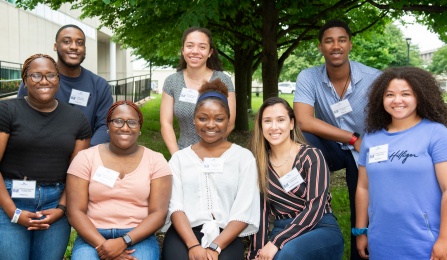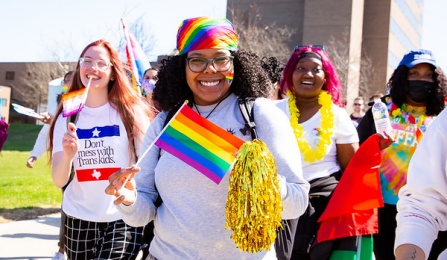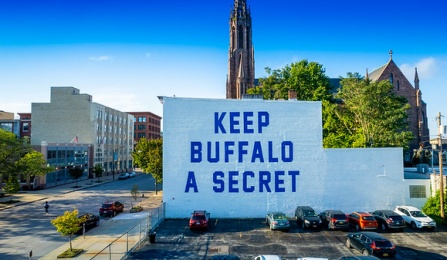Student Resources
Need help navigating graduate student life at UB and the Jacobs School? Check out these resources to get started!
The CLIMB Program at UB is devoted to helping students and junior scientists develop into leaders in the sciences.
The CLIMB Program is predicated on the vision that the future of science rests with those who are most adept at communicating and working with others across diverse scientific, intellectual, ethnic, socioeconomic and cultural domains. The CLIMB Program offers research opportunities, mentoring and professional development workshops to help its scholars develop into well-rounded professionals who will be leaders in their chosen field.

How to Choose a Mentor Workbook
Is selecting a research mentor in your near future? Already feeling overwhelmed by the process?
Don't worry, we've compiled a workbook just for you! How to Choose a Mentor: 7 Steps to Find the Perfect Match is available to download at the link below.
You'll learn what makes a good mentor, how to prioritize your wishlist, how to craft an introductory email, and so much more. Download your workbook, and get started today!

Office of Biomedical Education Graduate Student Travel Awards
The Office of Biomedical Education has travel funds that are available to assist with expenses when graduate students attend meetings to present their research. If you will be presenting a poster or talk at an upcoming meeting, we encourage you to utilize these funds.
Mentoring Advocacy Policy
The relationship between a graduate student and their research adviser is unlike most relationships in academic matriculation. The long-term nature of this relationship, which often extends beyond graduate school, requires a level of commitment and care on the part of both trainee and trainer. It is important to the integrity of the relationship that conflicts between trainee and trainer be addressed quickly and without escalation, if possible. While many issues can be resolved through direct conversation between the mentor and trainee, some may prove more challenging. To that end, a group of Jacobs School faculty called Mentoring Advocates have been assembled to consult with trainees and faculty on how to address conflicts and, if necessary, to assist with conflict mediation and resolution. A list of these faculty is available below.
Additional Academic Resources
Student Government
We collaborate, plan and coordinate with partners across the university — students, faculty, and staff — to build a culture of diversity, social justice and inclusion that makes all of us stronger.

Services are free, voluntary and confidential. Counseling services are provided by psychologists; a consulting psychiatrist is available as needed. Katherine Miller-Procknal, PhD, is our embedded counselor at the Jacobs School of Medicine and Biomedical Sciences.
UB Counseling Services can meet with Jacobs School of Medicine and Biomedical Sciences medical students and graduate students at the downtown campus building on a limited basis.
Notify UB Counseling Services that you wish to meet with a counselor at the Jacobs School building during your initial assessment.

Katherine Miller-Procknal, PhD
Senior Counselor
Counseling Services
955 Main Street, Room 1103, Buffalo, NY 14203
Email: ktm7@buffalo.edu
If you prefer to have services on the North or South Campus, or your availability does not match counselor availability, you may opt to meet with the counselor at one of our other locations or may opt to see a different counselor.
North Campus
Call to make an appointment with counselors on the North Campus.
Student Life
University at Buffalo
120 Richmond Quadrangle, North Campus
Buffalo, NY 14261
Phone: 716-645-2720; Fax: 716-645-2175
South Campus location closed to walk-in traffic at this time.
South Campus
University at Buffalo
1st Floor Michael Hall, South Campus
Buffalo, NY 14214
On-Campus:
- Call University Police: 716-645-2222
- Call Counseling Services: 716-645-2720 (After hours: press option “2” to for the crisis counselor.)
Off-Campus:
- Call 911
- Crisis Services of Erie County 24-hour Hotline: 716-834-3131
- Suicide and Crisis Lifeline, text 988 or dial 1-800-273-TALK (8255)
- 24-hour Crisis Text Line, text: “HOME” to 741741
Community Providers
Finding care can be tough, and as a student you have plenty of other priorities demanding your time and energy. University at Buffalo partners with ThrivingCampus to help make it easier for you to know your options for care in the broader community around campus.
Housing Resources

Whether you are looking to live on campus or off campus, Buffalo is an incredible (and affordable) place to live! The link below will provide a starting point if you’re seeking apartment rental or home purchase while attending the Jacobs School of Medicine and Biomedical Sciences.